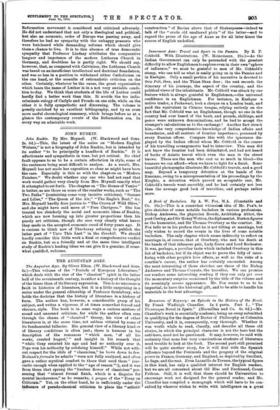THE AUGUSTAN AGES.
The Augustan Ages. By Oliver Elton. (W. Blackwood and Sons. 5s.)—This volume of the "Periods of European Literature," which deals with the rise of the "classical" spirit in the latter half of the seventeenth century, is rather a history of the thought of the times than of its literary expression. This is no uncommon fault in histories of literature, but it is a little surprising in a series under the general editorship of Professor Saintsbury, who holds the doctrine that the history of literature is a history of form. The author has, however, a considerable grasp of his subject, and writes a vigorous, if at times somewhat forced and obscure, style. The book is in some ways a curious mixture of sound and unsound criticism, for while the author often sees through the shams of " classical " theory, his view of other literatures is, at the same time, not seldom vitiated by some of its fundamental fallacies. His general view of a literary kind or of literary conditions is often just ; there is humour in his description of the romances " which man, of all his works, created hugest,'" and insight in his remark that "while Gray resisted his age and had no authority over it, Pope won his authority by subduing himself." While not with- out respect for the idols of "classicism," he bows down to few. Boileau's forma/re he admits "were not fully analysed, and often gave a rather mystical comfort to those that used them" (sar- castic enough when applied to the "age of reason " !), and it was from these that sprang the " hueless flower of classicism" pos- sessing that "utmost formal finish, which is a disguise for mental incoherence," as he remarks, d propos of the "Essay on Criticism." Yet, on the other hand, he is sufficiently under the influence of pseudo-classical criticism to place the "artistic
construction" of Racine above that of Shakespeam—indeed talk of the "crude old unaltered plots" of the latter—and to regard the prose of the age of Anne as for all later times the source of English undefiled.


















































 Previous page
Previous page